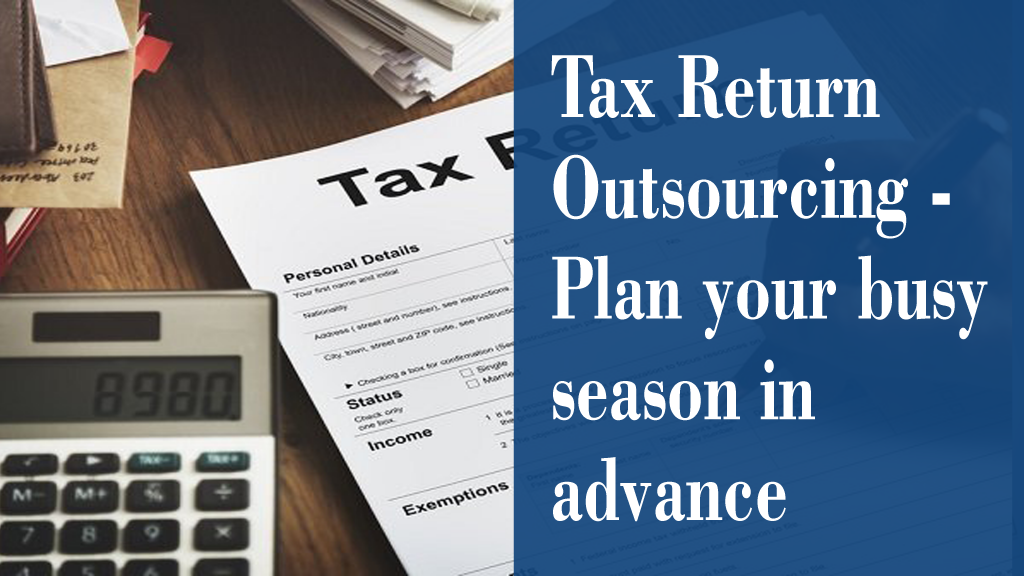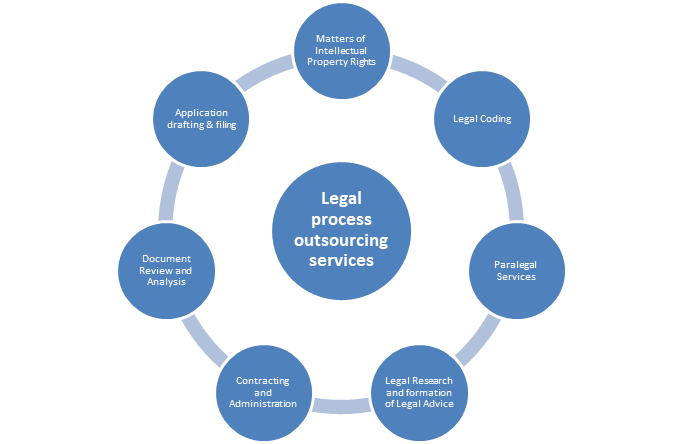Tax preparation outsourcing 101: Everything you need to know
Contents
- Tax Preparation Outsourcing 101: Everything You Need To Know
Tax Preparation Outsourcing 101: Everything You Need To Know

Tax preparation outsourcing is a game-changer for public accounting firms of all sizes. By integrating skilled onshore and offshore tax professionals, firms can reduce costs by up to 60%. This approach boosts morale and productivity by cutting down on long hours and weekend work and eliminates peak season overtime expenses. Staff can then focus on more valuable tasks while transforming variable costs into fixed ones. The time zone difference accelerates turnaround times on returns, and document management processes improve significantly.
Which tax returns should you consider outsourcing?

When determining which tax returns to outsource, it is essential to develop a strategic plan. Ask yourself the following –
- Which returns are the most profitable?
- Are complex returns demanding too much manual effort, pulling focus from higher-value services?
- Are your fees adequate for the services provided?
Consider every factor, from fees to non-billable hours, as time is a limited resource. Identify which returns and services yield the most profit when handled in-house. Outsource other tax preparation work to concentrate on the activities that drive your firm’s success. This approach optimizes your operations and enhances overall efficiency.
Tax Preparation Outsourcing Process

Tax preparation outsourcing offers a streamlined solution for accounting firms overwhelmed by the complexities of tax season. It involves transferring routine and time-consuming tax preparation tasks to a third-party provider. These experts handle a comprehensive range of returns efficiently, accurately, and cost-effectively. Tax preparation becomes even more demanding with last-minute amendments, client follow-ups, and talent shortages. As an accounting firm owner, you are tasked with meeting deadlines and boosting productivity.
By outsourcing, your firm can leverage experienced offshore tax preparers for preparation and initial reviews. It enables your in-house team to focus on high-value advisory roles. Outsourcing isn’t a one-step process. It requires careful planning and research to integrate smoothly into your operations. Follow these steps to get started with the outsourcing process –
Step1 – Define your objectives
Begin by determining why outsourcing is essential for your firm and what specific outcomes you aim to achieve. Whether you aim to cut costs, tap into higher skills, manage risks, or explore new growth avenues. A clearly defined set of goals will guide your decision-making and shape the terms of your outsourcing contract.
Step 2: Define financial terms and budget
Defining financial terms is crucial for a smooth outsourcing project. Start by creating a detailed budget and determining whether to compensate the service provider based on hourly rates or a fixed per-project fee. Clearly outline the deliverables and expectations. This upfront clarity helps prevent misunderstandings and ensures both parties are aligned financially. Additionally, make sure to plan for various business scenarios to accommodate potential changes in scope or requirements. A well-defined financial plan ensures effective cost management and a transparent financial arrangement throughout the project.
Step 3: Select the right engagement model
Choosing the right engagement model is crucial for aligning outsourcing with your firm’s needs. Concentrate on the specific skills and expertise needed to meet your objectives. Clearly identifying these needs will guide you in selecting the most suitable outsourcing model, whether onshore or offshore. Each model offers different advantages and pricing structures, so consider which aligns best with your firm’s operational goals and requirements. This careful selection ensures that the outsourcing arrangement effectively supports your strategic objectives and enhances overall efficiency.
Step 4: Perform a comprehensive risk assessment
Conducting a risk assessment is essential to safeguard the success of your outsourcing strategy. Define key performance indicators to measure the effectiveness of the outsourcing arrangement. Regularly evaluate these KPIs to monitor progress and identify any emerging issues. This proactive strategy enables you to tackle potential risks and adjust the outsourcing model.
Step 5: Partner with the right service provider and select the ideal candidate
Conduct comprehensive research to identify your CPA firm’s most appropriate outsourcing partner. This involves analyzing market trends, studying competitors, and evaluating potential providers. Once you have selected an outsourcing firm, the next step is to choose the right candidate from their pool of profiles. Leading global providers offer the opportunity to conduct virtual interviews with their talent. This ensures you select a skilled professional who seamlessly integrates with your team, enhancing your firm’s capabilities and efficiency.
Step 6: Finalize the agreement and onboard your offshore team
Finalize the process by signing a service-level agreement defining the outsourcing partnership’s terms and expectations. Begin the onboarding process for your offshore tax preparers, ensuring they are seamlessly integrated into your team. Properly formalizing and onboarding will set the stage for a successful and productive collaboration.
Qualities of a Trusted Tax Outsourcing Service Provider

Here are the top 5 traits to look for in a reputable and trustworthy tax outsourcing provider.
1. Proven experience and track record
A top-tier outsourcing service provider should boast a substantial and verified track record. Look for firms with a history of successfully scaling businesses and a significant number of years in operation. The greater the experience and client base, the more reliable the provider will likely be, making them a superior choice.
2. Access to a highly skilled talent pool
An ideal outsourcing partner should offer access to a pool of highly skilled professionals. Ensure that the provider has a dedicated team of skilled professionals with extensive tax preparation experience. The best providers allow you to interview and select candidates, ensuring you get the talent that meets your needs.
3. Robust data security measures
Data security is most important when selecting an outsourcing provider. Choose a firm that adheres to ISO 27001 standards and employs advanced, secure IT systems. This ensures that your sensitive information is protected with the highest level of security, mitigating risks associated with data breaches.
4. Flexible engagement models
Look for a provider that offers flexible engagement models. Your ideal partner should present multiple options that accommodate scalability and simplify onboarding. This flexibility ensures that the outsourcing arrangement can evolve with your needs and remains hassle-free.
5. Timely delivery and exceptional support
An exceptional outsourcing partner is distinguished by their ability to deliver timely services and offer outstanding support. They should guarantee on-time results and be a reliable support system, ensuring your tasks are completed efficiently.
Conclusion
Outsourcing tax preparation offers CPA firms a significant competitive edge, addressing various challenges such as staffing shortages, skill gaps, or overwhelming workloads during peak tax season. By leveraging outsourced tax services, firms can enhance service offerings, meet client demands more efficiently, and boost client retention rates. This strategic move streamlines operations and allows firms to concentrate on growth, innovation, and expanding their specialized services. Outsourcing can enhance your firm’s capabilities and give you distinct benefits in the competitive landscape. Get in touch with our experts at Axtrics Australia today.
Frequently Asked Questions
Q1: What is tax preparation outsourcing?
Tax preparation outsourcing involves engaging an external firm or professional to manage tax-related tasks, including preparing, filing, and handling tax returns. This approach permits businesses to concentrate on core activities while ensuring tax obligations are met efficiently and accurately.
Q2: Why consider outsourcing tax preparation?
Outsourcing tax preparation offers several advantages, including time and resource savings, reduced errors, enhanced compliance with tax regulations, and access to specialized expertise. It also helps manage costs more effectively and improve overall efficiency.
Q3: What are the benefits of outsourcing tax preparation?
The major benefits of tax preparation outsourcing are cost savings, access to specialized knowledge, improved accuracy and compliance, reduced workload on internal staff, and the capacity to concentrate on core business functions.
Q4: How to choose a tax preparation outsourcing provider?
Selecting a provider should involve evaluating their experience, reputation, and expertise in the relevant industry. They should offer the necessary services like tax planning and filing. Verify their adherence to regulatory standards and assess their working criteria and customer service.
Q5: What should you look for in a tax preparation outsourcing partner?
Key considerations include a proven track record, expertise in handling complex tax situations, strong data security measures, and clear communication channels. The partner should understand the business’s unique needs and offer tailored solutions.
Q6: How is data security managed in tax preparation outsourcing?
Reputable outsourcing providers implement comprehensive security measures to protect sensitive financial and personal data. These measures include encryption, secure data storage, and strict access controls. Reviewing the provider’s data protection policies is essential before agreeing.
Q7: Can outsourcing tax preparation firms ensure tax compliance?
Yes! Outsourcing tax preparation firms ensures compliance with current tax laws and regulations. Professional firms stay informed about changes in tax laws and can offer guidance to avoid penalties and legal issues.
Q8: How can outsourcing tax preparation enhance efficiency?
Outsourcing tax preparation can significantly enhance efficiency by streamlining the tax process, reducing the burden on internal staff, and leveraging the expertise of tax management professionals. This allows businesses to ensure that tax tasks are completed accurately and quickly.
Q9: How can we ensure a smooth transition to outsourcing tax preparation?
Communicate expectations and requirements with the outsourcing provider to ensure a smooth transition. Provide all necessary documentation and establish a timeline for the transition. Regular progress reviews and prompt issue resolution are also important.
Q10: What costs are associated with outsourcing tax preparation?
Costs vary based on the complexity of the tax situation and the services provided by the outsourcing firm. It is important to discuss and agree on pricing in advance, including any additional fees for extra services or unforeseen issues.
